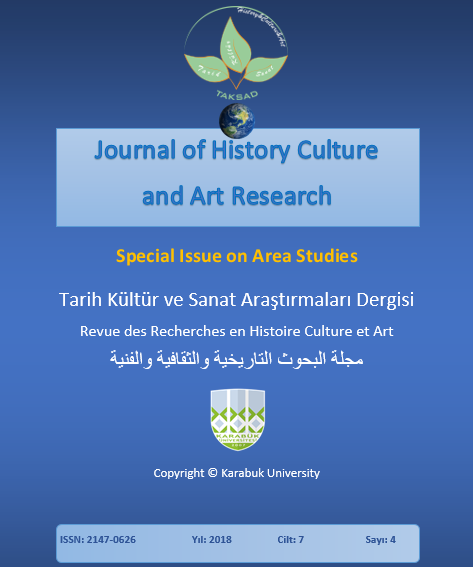Basic Conditions of Performing Freedom in Teaching Methods by F. Liszt and N. K. Medtner in the Aspect of Romantic View of the World
DOI:
https://doi.org/10.7596/taksad.v7i4.1862Keywords:
Romanticism, performing art, Piano, Teaching method, Temperament, Franz Liszt, Nikolai K. Medtner, Performer’s freedom.Abstract
Ideas on the relationship between the notes of the gamma scale were perceived from the time of antiquity to the Enlightenment as a key to understanding the structure of the universe with a characteristic analytic component. Disclosure emphasis of the human in culture determined the higher ideals associated with the self-knowledge of man, with the overcoming of the constraining conventions of being. The change in the musical form of the work in the era of Romanticism is largely due to the invention of the modern setting, known as a uniform temperament, the acceptance of it was made hard primarily by mathematical and philosophical discourse over the centuries. The change in the musical system in combination with the accepted ideals of the Romantic era determined the appearance of music by romantic composers. Improving of the piano mechanics and the keyboard system significantly expanded the range of expressive means and predetermined the further development of the piano playing technique. Teaching activities by F. Liszt and N.K. Medtner is associated with the development of the ideas of romanticism and the basic principles of the performing arts of romantics. Music teachers give special attention to an analysis of the pianistic apparatus, which is of great importance in improving the performing arts of playing the piano. Continuity of students in the sphere of basic principles of performing freedom determines the relevance of techniques based on key features of the pianist performing arts of romantics.
References
André, P. (2014). Gray Clouds, the last pilgrimage of Franz Liszt. Magnanville: The Editor Passenger.
Buas'e, А. (2013). List’s lessons. [transl. from french., comments by N. P. Korykhalovoj]. St-Petersburg: Composer.
Makovelsky A.O. (1999). Pre-Socratics: Pre-Eleat and Eleat Periods. Mn.: KHarvest, 784.
Аdo А.V. et al. (1991). Philosophical Dictionary; by ed. I.T. Frolova. 6th ed., Revised. and added. Moscow: Politizdat.
Heindel, M. (1984). Handel M. Cosmogonic Conception of Rosicrucians. The main course on the past evolution of man, his current constitution and future development. In 2 volumes. M.: Scholar's. 556.
Hess, J. (2016). Interrupting the symphony: unpacking the importance placed on classical concert experiences. Music Education Research, 20(1), 11-21. DOI: 10.1080/14613808.2016.1202224
Isakoff, S. (2016). Musical system: How Music Became a Battleground for the Great Minds of Western Civilization. transl. from English by L. Gankin. Moscow: АST, Corpus.
Kagantseva, L. P. (2017). Tonality: The Semantic Aspect. Problems of musical science, 4, 78–84.
Krylova, A. V. (2017). The Modal Foundations of Classicism in the Context of the World Perception of the 18th Century Music Scholarship. Problems of musical science, 1, 33–38.
Kurganskaya, O. А. (2015). Problems of adaptation of music pedagogy to the requirements of the time. Bulletin of Belgorod State Technological University named after V.M. Shukhov. N. 3. 202–206.
Kuznetsova, А. V. (2014). S. A. Dolgacheva’s Romanticism in the European Music Culture (Bibliographic Glossary). Belgorod: IPTS Polyterra.
Kuznetsova, А. V. & Kuznetsov, А. V. (2015). Mythological consciousness of romantics in the aspect of the pre-predicative structures of the archetypal states of the human spirit. Scientific Gazette of Belgorod State University. Series: Philosophy. Sotsiology. Right. 2015. T. 33. № 14 (211). 87–91.
Liszt, F. (1959). Selected Articles. Preface and General Ed. by J. Milstein; Ed. text, entry article and footnotes by S. Barsky. Moscow: Muzgiz.
Losev, А. F. (1995). The form. Style. Expression; Afterword by V.V. Bychkova, M.M. Gamayunova. M.: Mysl.
Metner, N. K. (1979). The daily work of the pianist and composer: Stranits from notebooks by Nikolai Karlovich. 2nd ed. Moscow: Music. (Questions of history, theory, methods).
Mikhajlova, А. V. (eds.). Aesthetic ideas of non-german romanticism. Aesthetics of non-german romantics, (PP-43). Moscow: Art.
Mil'shtein, Ya. I. (1971). F. Liszt. 2nd ed., Expanded. and add. Moscow: Music, 1971.
Schlegel, F. (1983). Aesthetics. Philosophy. Criticism: introd. comp., transl. by Yu. N. Popova. Moscow: Art, (History of aesthetics in monuments and documents). V. 1., 479.
Shajmukhametova, L. N. (2007). Semantic analysis of a musical text (on the development of a problem scientific research laboratory of music semantics. Problems of musical science, 1 (1), 31–44.
Varlamov, D. I. & Vinogradova, E. S. (2013). Theoretical and methodological foundations of the study of the performer's school in music. Fundamental research, 11 (7), 1407–1411.
Zhelnov, V. M. (1999). Epistemology in the context of the twentieth century (the main paradigms: the laws of formation and evolyutsii) - Author. on the competition uch.st. Ph.D. Moscow: Moscow State University.
Downloads
Published
How to Cite
Issue
Section
License
All papers licensed under Creative Commons 4.0 CC-BY.- Share — copy and redistribute the material in any medium or format
- Adapt — remix, transform, and build upon the material for any purpose, even commercially.
Under the following terms:
Attribution — You must give appropriate credit, provide a link to the license, and indicate if changes were made. You may do so in any reasonable manner, but not in any way that suggests the licensor endorses you or your use.
- No additional restrictions — You may not apply legal terms or technological measures that legally restrict others from doing anything the license permits.







